Impact of Culture, Politics, and Power on John Lewis's Behavior
VerifiedAdded on 2023/01/11
|5
|1363
|57
Report
AI Summary
This report provides an analysis of the organizational behavior within John Lewis Company, focusing on how organizational culture, politics, and power influence individual and team behavior. It utilizes Handy's cultural model, exploring power, role, task, and person cultures, and examines the impact of these on employee empowerment and motivation. The report further applies the French and Raven model to understand different types of power within the organization, including legitimate, reward, expert, referent, coercive, and information power. The analysis highlights how these concepts affect employee roles, task assignments, and overall company operations, providing insights into the company's approach to employee development and loyalty. The report references various books and journals to support its findings.
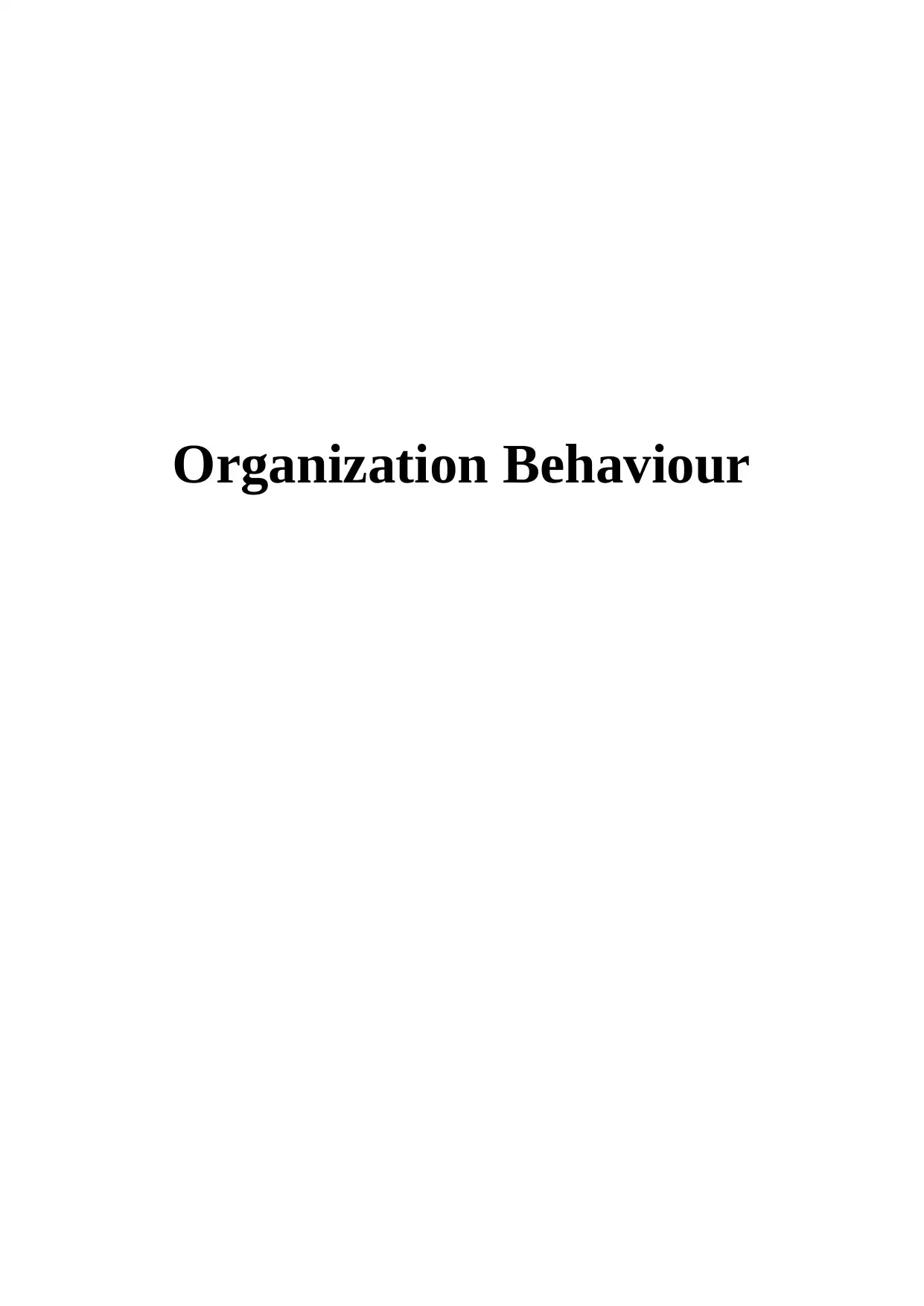
Organization Behaviour
Paraphrase This Document
Need a fresh take? Get an instant paraphrase of this document with our AI Paraphraser
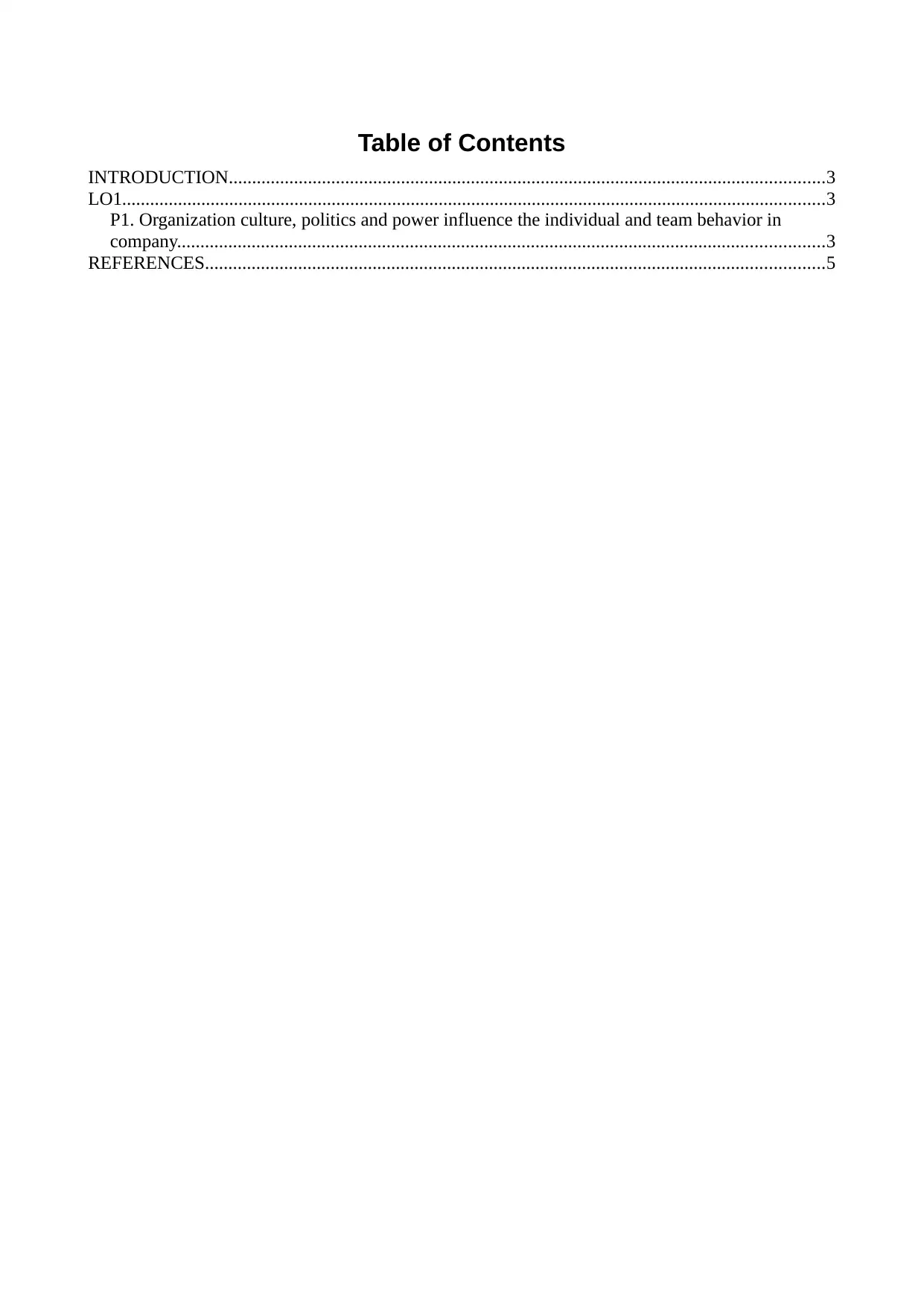
Table of Contents
INTRODUCTION................................................................................................................................3
LO1.......................................................................................................................................................3
P1. Organization culture, politics and power influence the individual and team behavior in
company...........................................................................................................................................3
REFERENCES.....................................................................................................................................5
INTRODUCTION................................................................................................................................3
LO1.......................................................................................................................................................3
P1. Organization culture, politics and power influence the individual and team behavior in
company...........................................................................................................................................3
REFERENCES.....................................................................................................................................5
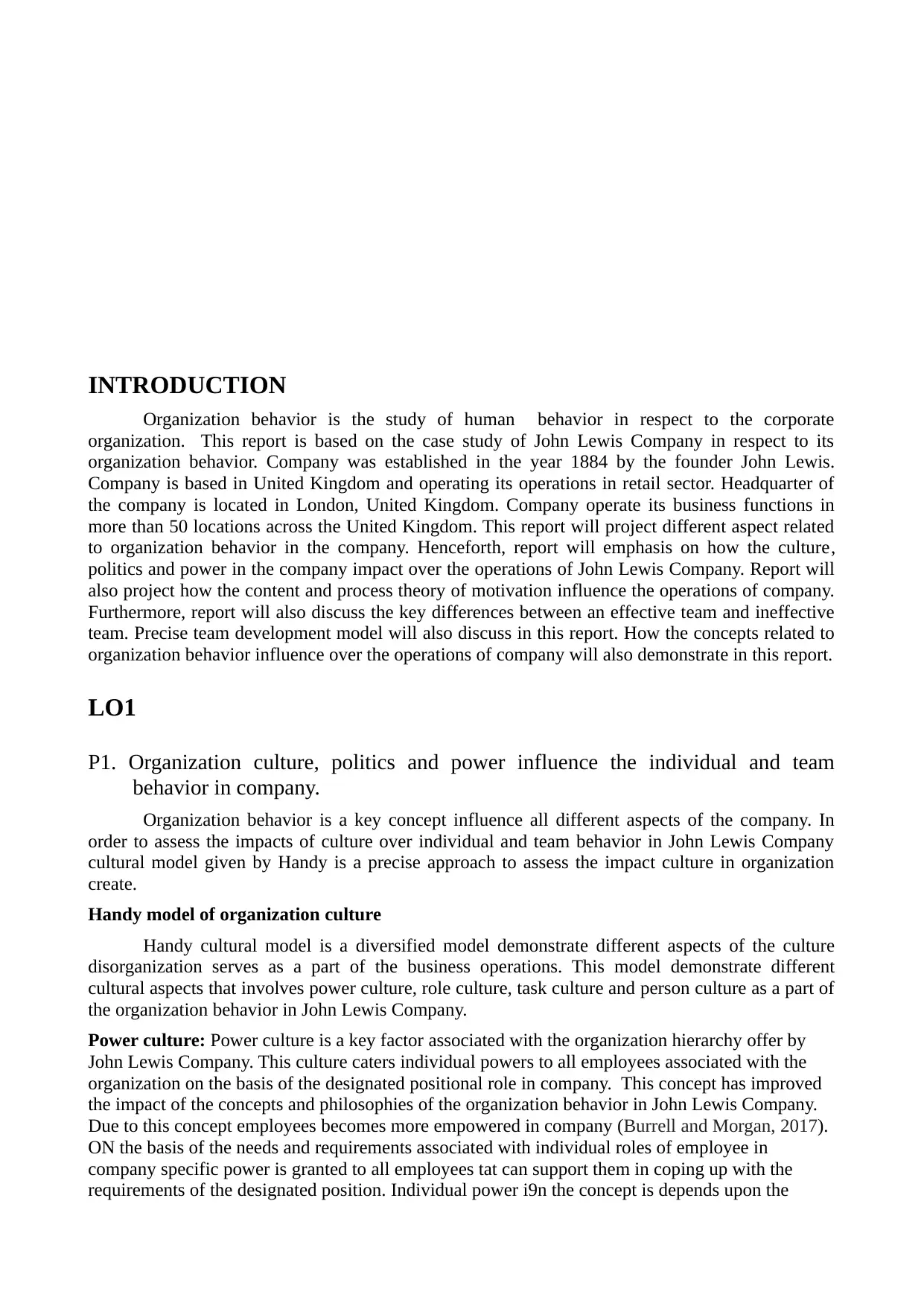
INTRODUCTION
Organization behavior is the study of human behavior in respect to the corporate
organization. This report is based on the case study of John Lewis Company in respect to its
organization behavior. Company was established in the year 1884 by the founder John Lewis.
Company is based in United Kingdom and operating its operations in retail sector. Headquarter of
the company is located in London, United Kingdom. Company operate its business functions in
more than 50 locations across the United Kingdom. This report will project different aspect related
to organization behavior in the company. Henceforth, report will emphasis on how the culture,
politics and power in the company impact over the operations of John Lewis Company. Report will
also project how the content and process theory of motivation influence the operations of company.
Furthermore, report will also discuss the key differences between an effective team and ineffective
team. Precise team development model will also discuss in this report. How the concepts related to
organization behavior influence over the operations of company will also demonstrate in this report.
LO1
P1. Organization culture, politics and power influence the individual and team
behavior in company.
Organization behavior is a key concept influence all different aspects of the company. In
order to assess the impacts of culture over individual and team behavior in John Lewis Company
cultural model given by Handy is a precise approach to assess the impact culture in organization
create.
Handy model of organization culture
Handy cultural model is a diversified model demonstrate different aspects of the culture
disorganization serves as a part of the business operations. This model demonstrate different
cultural aspects that involves power culture, role culture, task culture and person culture as a part of
the organization behavior in John Lewis Company.
Power culture: Power culture is a key factor associated with the organization hierarchy offer by
John Lewis Company. This culture caters individual powers to all employees associated with the
organization on the basis of the designated positional role in company. This concept has improved
the impact of the concepts and philosophies of the organization behavior in John Lewis Company.
Due to this concept employees becomes more empowered in company (Burrell and Morgan, 2017).
ON the basis of the needs and requirements associated with individual roles of employee in
company specific power is granted to all employees tat can support them in coping up with the
requirements of the designated position. Individual power i9n the concept is depends upon the
Organization behavior is the study of human behavior in respect to the corporate
organization. This report is based on the case study of John Lewis Company in respect to its
organization behavior. Company was established in the year 1884 by the founder John Lewis.
Company is based in United Kingdom and operating its operations in retail sector. Headquarter of
the company is located in London, United Kingdom. Company operate its business functions in
more than 50 locations across the United Kingdom. This report will project different aspect related
to organization behavior in the company. Henceforth, report will emphasis on how the culture,
politics and power in the company impact over the operations of John Lewis Company. Report will
also project how the content and process theory of motivation influence the operations of company.
Furthermore, report will also discuss the key differences between an effective team and ineffective
team. Precise team development model will also discuss in this report. How the concepts related to
organization behavior influence over the operations of company will also demonstrate in this report.
LO1
P1. Organization culture, politics and power influence the individual and team
behavior in company.
Organization behavior is a key concept influence all different aspects of the company. In
order to assess the impacts of culture over individual and team behavior in John Lewis Company
cultural model given by Handy is a precise approach to assess the impact culture in organization
create.
Handy model of organization culture
Handy cultural model is a diversified model demonstrate different aspects of the culture
disorganization serves as a part of the business operations. This model demonstrate different
cultural aspects that involves power culture, role culture, task culture and person culture as a part of
the organization behavior in John Lewis Company.
Power culture: Power culture is a key factor associated with the organization hierarchy offer by
John Lewis Company. This culture caters individual powers to all employees associated with the
organization on the basis of the designated positional role in company. This concept has improved
the impact of the concepts and philosophies of the organization behavior in John Lewis Company.
Due to this concept employees becomes more empowered in company (Burrell and Morgan, 2017).
ON the basis of the needs and requirements associated with individual roles of employee in
company specific power is granted to all employees tat can support them in coping up with the
requirements of the designated position. Individual power i9n the concept is depends upon the
⊘ This is a preview!⊘
Do you want full access?
Subscribe today to unlock all pages.

Trusted by 1+ million students worldwide
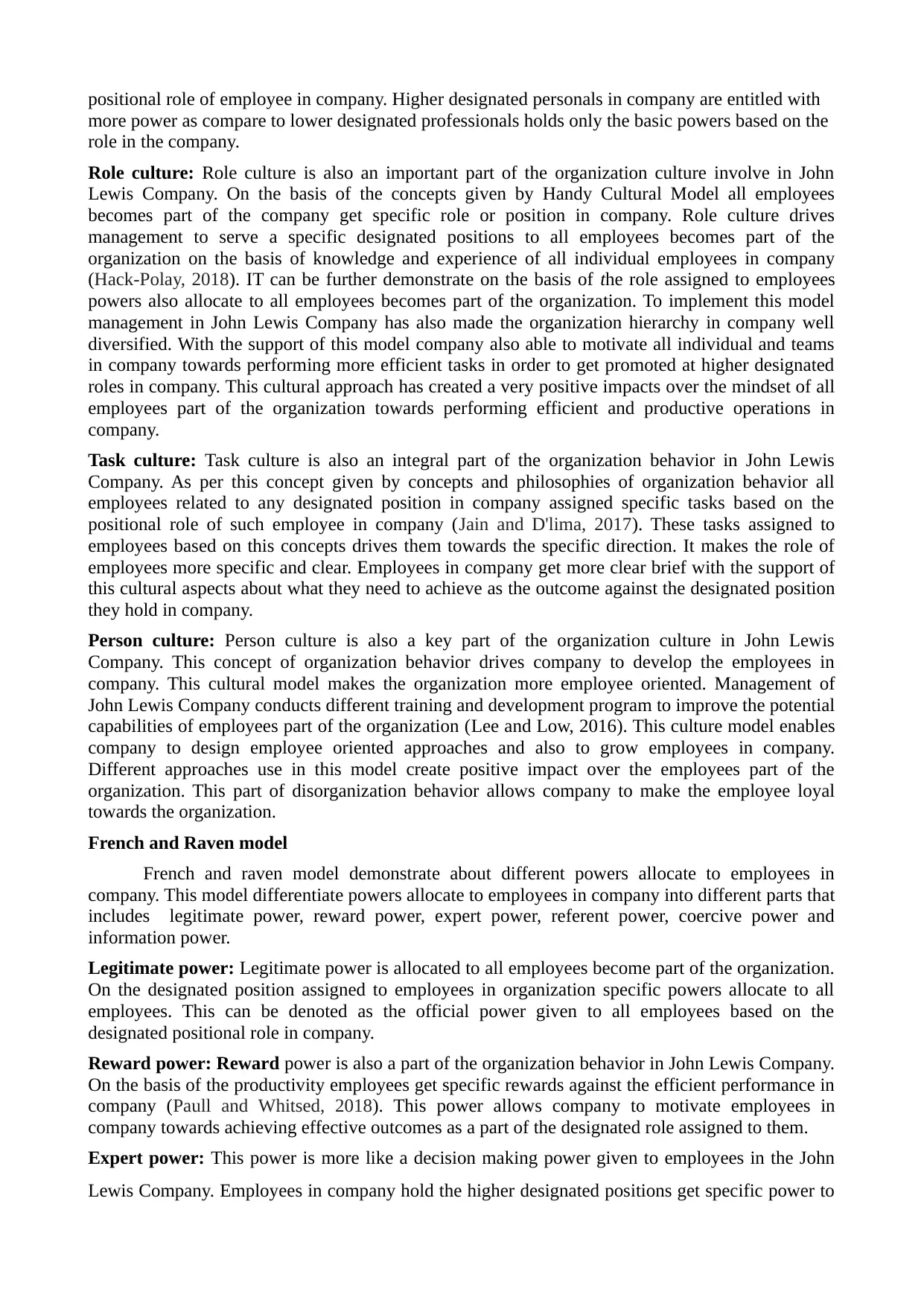
positional role of employee in company. Higher designated personals in company are entitled with
more power as compare to lower designated professionals holds only the basic powers based on the
role in the company.
Role culture: Role culture is also an important part of the organization culture involve in John
Lewis Company. On the basis of the concepts given by Handy Cultural Model all employees
becomes part of the company get specific role or position in company. Role culture drives
management to serve a specific designated positions to all employees becomes part of the
organization on the basis of knowledge and experience of all individual employees in company
(Hack-Polay, 2018). IT can be further demonstrate on the basis of the role assigned to employees
powers also allocate to all employees becomes part of the organization. To implement this model
management in John Lewis Company has also made the organization hierarchy in company well
diversified. With the support of this model company also able to motivate all individual and teams
in company towards performing more efficient tasks in order to get promoted at higher designated
roles in company. This cultural approach has created a very positive impacts over the mindset of all
employees part of the organization towards performing efficient and productive operations in
company.
Task culture: Task culture is also an integral part of the organization behavior in John Lewis
Company. As per this concept given by concepts and philosophies of organization behavior all
employees related to any designated position in company assigned specific tasks based on the
positional role of such employee in company (Jain and D'lima, 2017). These tasks assigned to
employees based on this concepts drives them towards the specific direction. It makes the role of
employees more specific and clear. Employees in company get more clear brief with the support of
this cultural aspects about what they need to achieve as the outcome against the designated position
they hold in company.
Person culture: Person culture is also a key part of the organization culture in John Lewis
Company. This concept of organization behavior drives company to develop the employees in
company. This cultural model makes the organization more employee oriented. Management of
John Lewis Company conducts different training and development program to improve the potential
capabilities of employees part of the organization (Lee and Low, 2016). This culture model enables
company to design employee oriented approaches and also to grow employees in company.
Different approaches use in this model create positive impact over the employees part of the
organization. This part of disorganization behavior allows company to make the employee loyal
towards the organization.
French and Raven model
French and raven model demonstrate about different powers allocate to employees in
company. This model differentiate powers allocate to employees in company into different parts that
includes legitimate power, reward power, expert power, referent power, coercive power and
information power.
Legitimate power: Legitimate power is allocated to all employees become part of the organization.
On the designated position assigned to employees in organization specific powers allocate to all
employees. This can be denoted as the official power given to all employees based on the
designated positional role in company.
Reward power: Reward power is also a part of the organization behavior in John Lewis Company.
On the basis of the productivity employees get specific rewards against the efficient performance in
company (Paull and Whitsed, 2018). This power allows company to motivate employees in
company towards achieving effective outcomes as a part of the designated role assigned to them.
Expert power: This power is more like a decision making power given to employees in the John
Lewis Company. Employees in company hold the higher designated positions get specific power to
more power as compare to lower designated professionals holds only the basic powers based on the
role in the company.
Role culture: Role culture is also an important part of the organization culture involve in John
Lewis Company. On the basis of the concepts given by Handy Cultural Model all employees
becomes part of the company get specific role or position in company. Role culture drives
management to serve a specific designated positions to all employees becomes part of the
organization on the basis of knowledge and experience of all individual employees in company
(Hack-Polay, 2018). IT can be further demonstrate on the basis of the role assigned to employees
powers also allocate to all employees becomes part of the organization. To implement this model
management in John Lewis Company has also made the organization hierarchy in company well
diversified. With the support of this model company also able to motivate all individual and teams
in company towards performing more efficient tasks in order to get promoted at higher designated
roles in company. This cultural approach has created a very positive impacts over the mindset of all
employees part of the organization towards performing efficient and productive operations in
company.
Task culture: Task culture is also an integral part of the organization behavior in John Lewis
Company. As per this concept given by concepts and philosophies of organization behavior all
employees related to any designated position in company assigned specific tasks based on the
positional role of such employee in company (Jain and D'lima, 2017). These tasks assigned to
employees based on this concepts drives them towards the specific direction. It makes the role of
employees more specific and clear. Employees in company get more clear brief with the support of
this cultural aspects about what they need to achieve as the outcome against the designated position
they hold in company.
Person culture: Person culture is also a key part of the organization culture in John Lewis
Company. This concept of organization behavior drives company to develop the employees in
company. This cultural model makes the organization more employee oriented. Management of
John Lewis Company conducts different training and development program to improve the potential
capabilities of employees part of the organization (Lee and Low, 2016). This culture model enables
company to design employee oriented approaches and also to grow employees in company.
Different approaches use in this model create positive impact over the employees part of the
organization. This part of disorganization behavior allows company to make the employee loyal
towards the organization.
French and Raven model
French and raven model demonstrate about different powers allocate to employees in
company. This model differentiate powers allocate to employees in company into different parts that
includes legitimate power, reward power, expert power, referent power, coercive power and
information power.
Legitimate power: Legitimate power is allocated to all employees become part of the organization.
On the designated position assigned to employees in organization specific powers allocate to all
employees. This can be denoted as the official power given to all employees based on the
designated positional role in company.
Reward power: Reward power is also a part of the organization behavior in John Lewis Company.
On the basis of the productivity employees get specific rewards against the efficient performance in
company (Paull and Whitsed, 2018). This power allows company to motivate employees in
company towards achieving effective outcomes as a part of the designated role assigned to them.
Expert power: This power is more like a decision making power given to employees in the John
Lewis Company. Employees in company hold the higher designated positions get specific power to
Paraphrase This Document
Need a fresh take? Get an instant paraphrase of this document with our AI Paraphraser
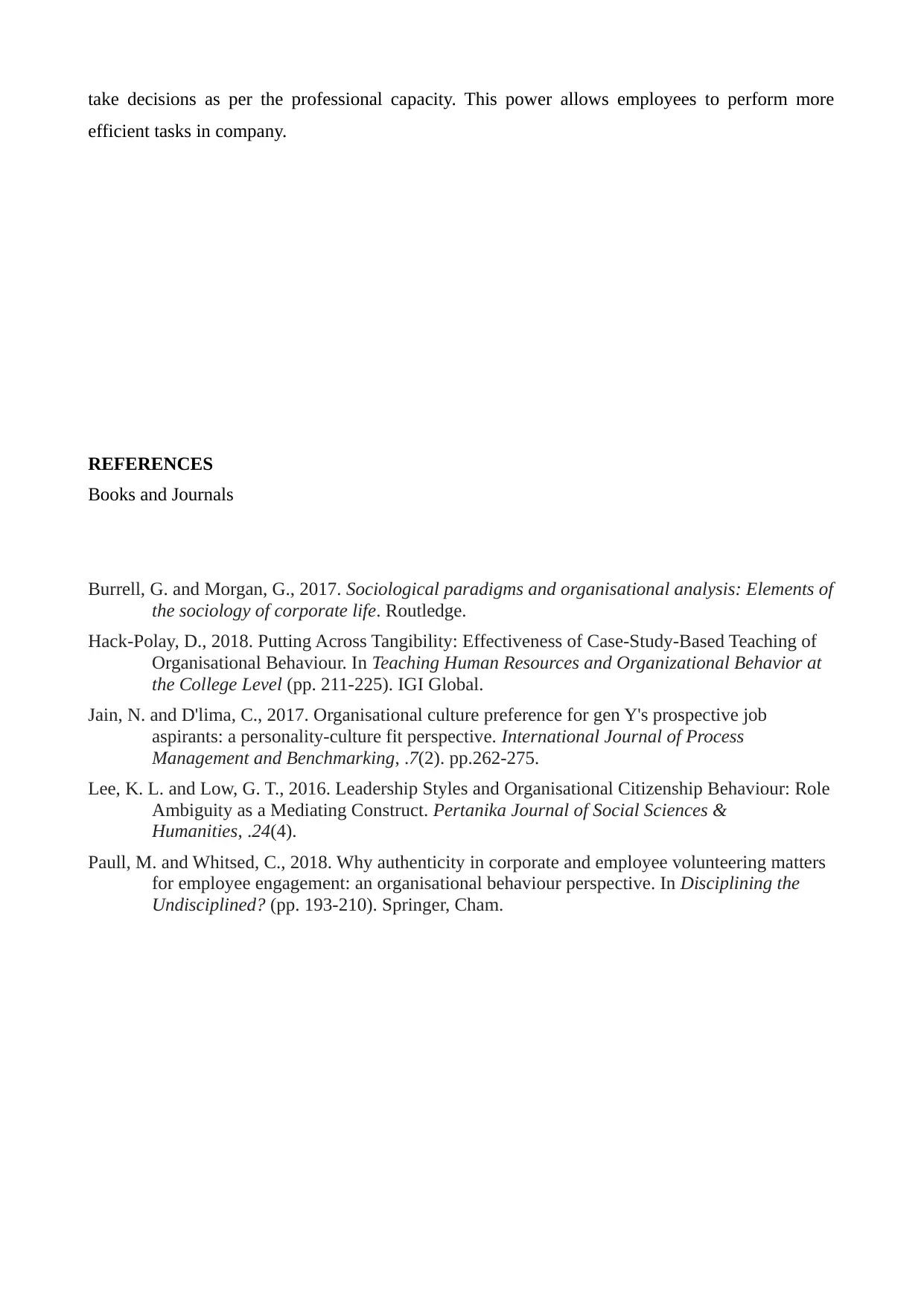
take decisions as per the professional capacity. This power allows employees to perform more
efficient tasks in company.
REFERENCES
Books and Journals
Burrell, G. and Morgan, G., 2017. Sociological paradigms and organisational analysis: Elements of
the sociology of corporate life. Routledge.
Hack-Polay, D., 2018. Putting Across Tangibility: Effectiveness of Case-Study-Based Teaching of
Organisational Behaviour. In Teaching Human Resources and Organizational Behavior at
the College Level (pp. 211-225). IGI Global.
Jain, N. and D'lima, C., 2017. Organisational culture preference for gen Y's prospective job
aspirants: a personality-culture fit perspective. International Journal of Process
Management and Benchmarking, .7(2). pp.262-275.
Lee, K. L. and Low, G. T., 2016. Leadership Styles and Organisational Citizenship Behaviour: Role
Ambiguity as a Mediating Construct. Pertanika Journal of Social Sciences &
Humanities, .24(4).
Paull, M. and Whitsed, C., 2018. Why authenticity in corporate and employee volunteering matters
for employee engagement: an organisational behaviour perspective. In Disciplining the
Undisciplined? (pp. 193-210). Springer, Cham.
efficient tasks in company.
REFERENCES
Books and Journals
Burrell, G. and Morgan, G., 2017. Sociological paradigms and organisational analysis: Elements of
the sociology of corporate life. Routledge.
Hack-Polay, D., 2018. Putting Across Tangibility: Effectiveness of Case-Study-Based Teaching of
Organisational Behaviour. In Teaching Human Resources and Organizational Behavior at
the College Level (pp. 211-225). IGI Global.
Jain, N. and D'lima, C., 2017. Organisational culture preference for gen Y's prospective job
aspirants: a personality-culture fit perspective. International Journal of Process
Management and Benchmarking, .7(2). pp.262-275.
Lee, K. L. and Low, G. T., 2016. Leadership Styles and Organisational Citizenship Behaviour: Role
Ambiguity as a Mediating Construct. Pertanika Journal of Social Sciences &
Humanities, .24(4).
Paull, M. and Whitsed, C., 2018. Why authenticity in corporate and employee volunteering matters
for employee engagement: an organisational behaviour perspective. In Disciplining the
Undisciplined? (pp. 193-210). Springer, Cham.
1 out of 5
Related Documents
Your All-in-One AI-Powered Toolkit for Academic Success.
+13062052269
info@desklib.com
Available 24*7 on WhatsApp / Email
![[object Object]](/_next/static/media/star-bottom.7253800d.svg)
Unlock your academic potential
Copyright © 2020–2025 A2Z Services. All Rights Reserved. Developed and managed by ZUCOL.





